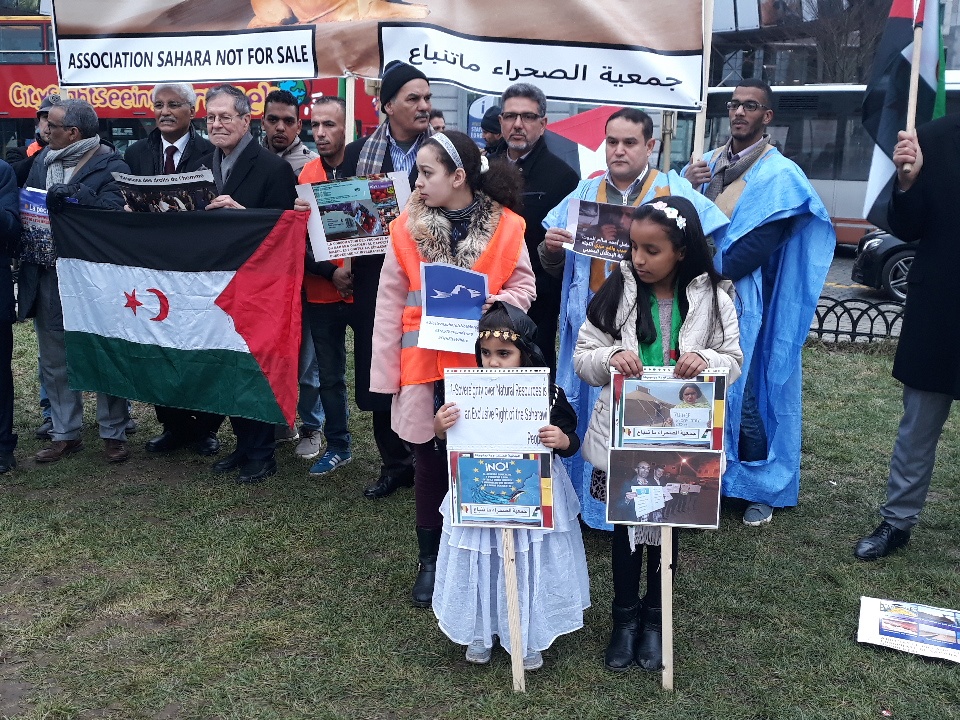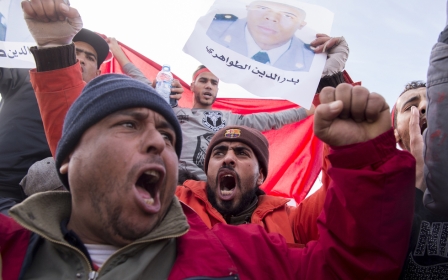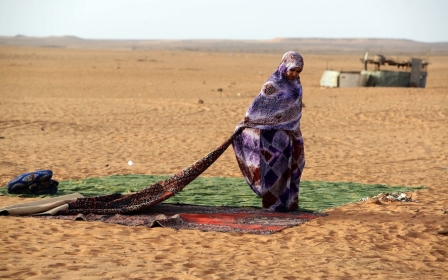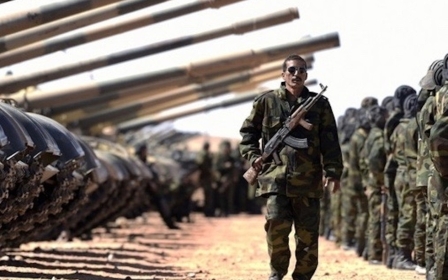EU trade deal with Morocco met by Sahrawi protestations
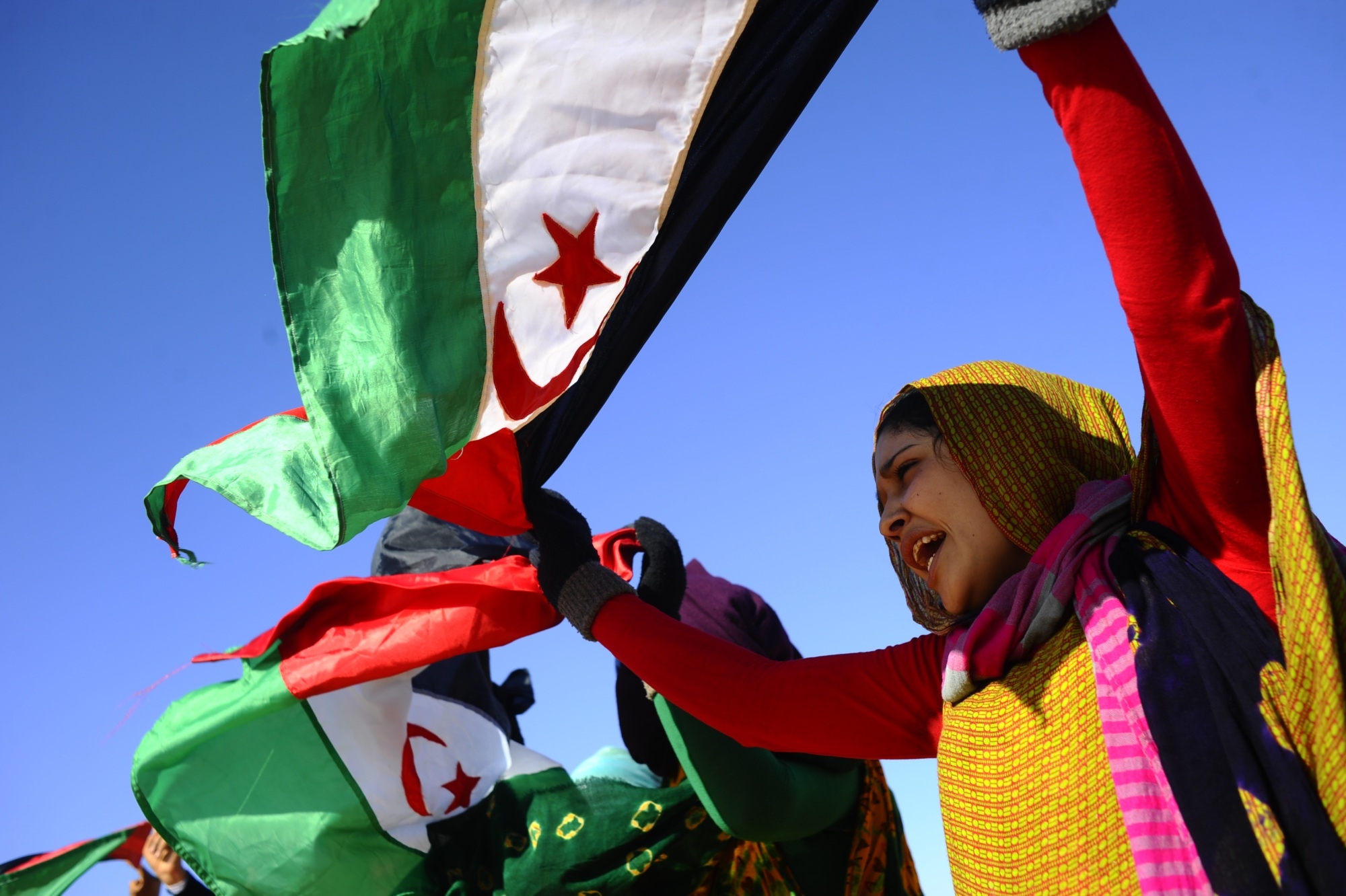
Sahrawi campaigners demonstrated outside the European Parliament in Brussels on Wednesday in protest against the agreement and extension of a European Union trade deal with Morocco that includes the disputed territory of Western Sahara.
Simultaneous demonstrations reportedly took place in Sahrawi refugee camps in Algeria, Mauritania and Laayoune, the largest city in Western Sahara.
Sahrawi activists and lawyers, the Polisario Front, and the UK’s Labour party told MEE they condemned the EU-Morocco trade agreement, which was approved with a sweeping majority by the European Parliament on 16 January.
The trade deal has once again put in the spotlight tensions over Sahrawi independence and sovereignty over natural resources, with some fearing it could further inflame the situation after more than 40 years of Moroccan occupation.
'Acting like pirates'
New MEE newsletter: Jerusalem Dispatch
Sign up to get the latest insights and analysis on Israel-Palestine, alongside Turkey Unpacked and other MEE newsletters
In spite of a European Court of Justice (ECJ) ruling stipulating that Western Sahara is “not part of the Moroccan kingdom” and therefore should not be included de facto in any trade agreements with Morocco, the recently agreed deal includes the territory and the waters around it. The Parliament has given European vessels the green light to fish the sea off the desert territory’s coastline.
The Moroccan argument has been that the people of Western Sahara are benefiting from the trade treaty and indeed that they campaigned for it. A pro-Moroccan activist claimed on social media that more than 300 representatives of Sahrawi society in the Western Sahara city of Dakhla urged the EU to renew the agreement.
Meanwhile, a pro-Moroccan Sahrawi group tweeted that putting the agreement in question would threaten the lives of Western Sahara residents.
However, activists in Brussels handed out open letters to European members of parliament that included the line: "There have been no efforts from the EU Commission to obtain the consent of the people of Western Sahara nor have we seen responsible engagement from the EU in negotiating with the Polisario Front," in reference to the Sahrawi national movement representing the indigenous people of Western Sahara.
Polisario representative Hamdi Bueha said that the group, which represents the indigenous people of Western Sahara, “condemns and categorically rejects” the EU-Morocco agreement. The agreement was “concluded behind closed doors”, Bueha told MEE, and is a “clear example of robbery orchestrated deliberately against the will of the people of Western Sahara” used to finance Morocco’s “occupation of Western Sahara, in defiance of international law”.
Maima Saih, the Polisario Front’s representative in Geneva, told MEE there was still plenty of time to annul the trade treaty.
“The Polisario will continue using the European judicial system to stop the plunder of Western Sahara’s natural resources,” she said. “Instead of respecting the European democracy values, European MPs who voted in favour of the agreement are acting like pirates to authorise an illegal trade deal.”
A legal battle seems inevitable, according to Haddamine Moulu Said, a Sahrawi lawyer who has been part of the campaign against the use of natural resources in Western Sahara before a resolution to the longstanding conflict is established.
Haddamine believes that this is a golden opportunity for the Polisario to immediately revoke the recently approved agreement.
“The EU Court of Justice justified the EU-Morocco trade agreement because Western Sahara was not explicitly mentioned in the draft. Now, it is clear that Western Sahara is included and the Polisario, as the only recognised representative of the Sahrawi people by the UN General Assembly, has the right to ask the ECJ to annul the agreement,” Haddamine told MEE.
Disgust and tension
Sahrawi activists told MEE of the pain they felt at the EU’s decision.
“There has been no regard for the rule of law or justice in this decision,” said Lallou Mustafa, an activist based in Laayoune. “I am truly disgusted."
“It was a clear message from the Europeans that no international body will end our suffering,” said Naziha el-Khalidi, a 27-year old media activist also living in Laayoune, who compared the deal to the dark days of European imperialism in Africa.
“Sahrawis are very upset with Europe, which never gave them anything,” said underground resistance member Mohammed Brahim, who requested to go by a pseudonym for this article. “Young people are anxious and frustrated. There is a lot of tension, which might cause big problems if justice is not achieved. The world does not need another war in North Africa.”
'The world does not need another war in North Africa'
- Mohammed Ibrahim, member of the Sahrawi resistance
Rare European support for the pro-independence Sahrawis over the deal came from Britain’s Labour party, whose leader Jeremy Corbyn is a longtime supporter of an independent Western Sahara. Fabian Hamilton, the party’s shadow minister for peace and disarmament, told MEE that the recent agreement backed by the European Parliament “is an affront to the Sahrawi people of Western Sahara - Africa’s last colony”.
Hamilton pointed to the ECJ’s ruling that “any agreement between the EU and Morocco is not applicable to Western Sahara or its waters” and said that the EU “must urgently engage with the Sahrawi people in order to bring about an agreement that benefits all sides while respecting international law”.
Natural resources at the heart of tensions
The Polisario Front was founded in 1973 to fight the Spanish government and any Moroccan claims to the territory. After the Spanish left what was then their colony, some 25,000 Moroccan troops and 350,000 civilians invaded Western Sahara in 1975 in what is known as the Green March.
Polisario fought Morocco until 1991 when a ceasefire was called and the United Nations promised a referendum on the territory’s independence within six months. Almost three decades on, the Sahrawis, the land’s native people, are still waiting.
One-third of the former Spanish Sahara was wrested from Mauritania by Polisario. This desert land is known to Sahrawis as the “liberated territories”. The rest is controlled by Morocco, whose claim to the land is not recognised by the UN. Sahrawis overwhelmingly live there under often-violent surveillance or in the refugee camps of southern Algeria, which supports Polisario.
Late last year, Polisario and Morocco sat at the same table in Geneva, along with Mauritania and Algeria as observing neighbours, for the first time in six years. Economic and security interests drive the EU and Morocco’s desire to stay close to each other.
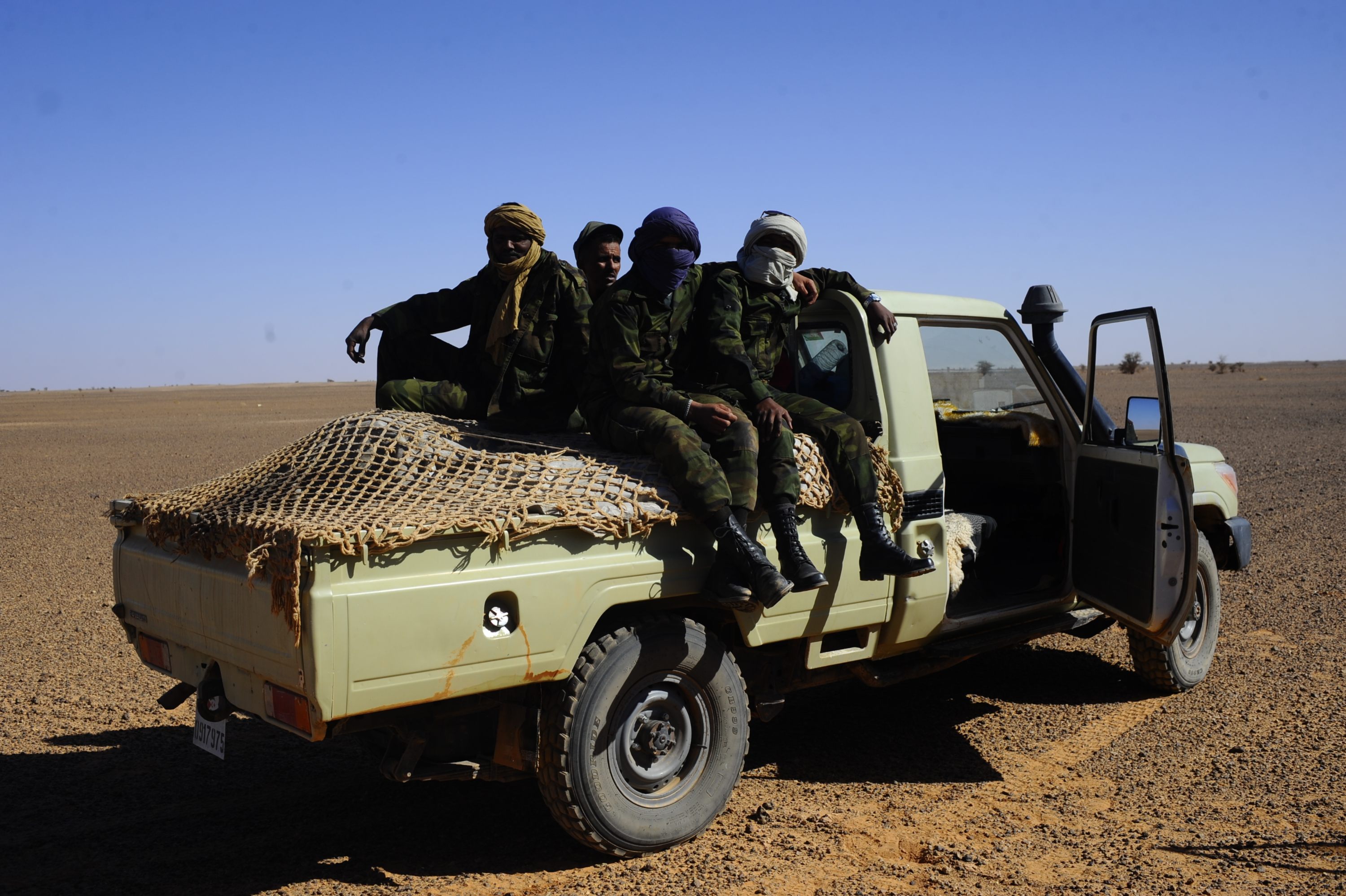
Western Sahara’s natural resources are a key part of the struggle between Morocco and the Sahrawi people. The territory is rich in phosphates, its seas are full of fish and there has been talk in the last few years of the presence of oil offshore. International companies - many of them European - are circling.
Activists campaigning for an independent Western Sahara have been pinning their hopes on the issue of natural resources to put more pressure on the Moroccan kingdom to gain the right of self-determination.
The trade deal could further worsen an already tense situation, worries Sidahmed Jouly - a leading activist who has been part of multiple campaigns as part of a peaceful Sahrawi civil society movement, NOVA, calling for the right of self-determination and independence.
“I think the impact of the approval is devastating to our work as campaigners who have always believed in a peaceful solution through international law and European institutions,” Jouly told MEE.
The trade deal, Jouly said, “will empower the argument of those who see war as the only way out of the continuous stalemate”.
Middle East Eye delivers independent and unrivalled coverage and analysis of the Middle East, North Africa and beyond. To learn more about republishing this content and the associated fees, please fill out this form. More about MEE can be found here.


